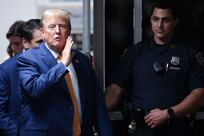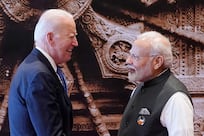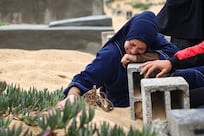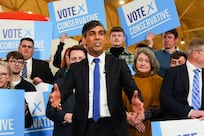Recently I watched a video that went viral from Dr David Price, a front line physician in the intensive care unit at Weill Cornell Medicine centre in New York City.
Dr Price specialises in treating critically ill people. These days he has a terrible role: he is tasked with deciding who gets a ventilator and who does not. His Zoom call was originally intended to go to his patients to reassure and “empower” them by dispelling rumours.
It is pragmatic and useful, the opposite of the scaremongering trolling social media.
In a perfect world, there would be no coronavirus and all doctors would be as straightforward as Dr Price.
But what happens in the real world if you got the virus and had a choice of where to get treated? Where would you go?
I am biased as I write this from France, which has one of the best healthcare systems in the world. But I have also lived in the UK and the US and have been treated in all three countries for various medical conditions, although not the novel coronavirus.
In Europe, it appears Germany has the most ICU beds and has managed the crisis the best, doing the most community testing and picking up more of the mild non-hospital cases. So far, they have the lowest mortality rate compared to neighbouring European countries. But if you can’t get to Germany, second, in my view, would be France.
Why France above the UK and US, where doctors generally undergo more years of specialised training?
First, during the Covid-19 crisis, France has had excellent leadership, unlike the US and the UK.
French President Emmanuel Macron set stern but not draconian lockdown measures and a former neurologist and Socialist MP, Olivier Veran, is the Minister of Solidarity and Health. Marseilles is said to be the best city in this crisis – per capita testing there has overtaken South Korea (across all districts, classes and age groups) and the mortality rate is now low.

I have experience with the French public healthcare system, which is accessible, affordable and ranked among the best in the world.
In 2004, I gave birth in a French public hospital; spent three weeks with an extremely high-risk pregnancy and a myriad health issues, and emerged as a mother with a healthy baby. And in 2015, in a terrible incident, I lost my vision and spent three weeks in a French public hospital, this one specialised in eye disorders. It was not chic. It was not fun. But the doctors there saved my vision. Both were practically free.
In France, infant mortality is one of the lowest in the world and life expectancy one of the highest. Even so, this does not help much in times of Coronavirus, where cases at one point doubled every four days. France faced a “crash test", in the words of one infectious disease specialist. But several factors helped, such as the centralised French system: decisions made in Paris were circulated around the country.
Mr Macron calls coronavirus a “war” and we have entered the trenches better prepared. First, back to my point that health care is free. We are refunded 70 per cent for illness and 100 per cent for chronic illness (such as cancer or Aids). In other words, the sicker the person is, the less they have to pay. Compare this to the teenager in California who died from coronavirus in March, turned away from urgent care because he did not have health insurance.
America often has medical breakthroughs because there is no nation-wide protocol for how to treat people, which has plus and minuses. For people like the teenager with no access to top medical care – the large majority – because they lack pricey health insurance, it is a tragedy. And an irony for such a rich country.
I come from a family of doctors in the US: my earliest memories are my mother bringing me to “Uncle Doc” who delivered all her seven babies and treated us for everything from broken bones to tonsils. He was an old fashioned general practitioner who studied everything at medical school – surgery, gynecology, pediatrics. But that world of a caring family doctor, in the Norman Rockwell mould, is gone. That was the 1970s, before HMOs – health maintenance organisations, medical insurance groups for a fixed (and skyrocketing) fee began to exploit the population.
We know the US health system is badly broken. If you have money and private insurance, you can get good doctors. Hospitals like Massachusetts General in Boston or Cornell Weill in New York are exemplary. If you don’t have private health insurance, you are in deep trouble. I have witnessed people who had cancer and no insurance where doctors whispered to their nurses, “He only gets ten minutes of our time. He’s got no insurance.”
In the UK, the National Health Service, Nigella Lawson, the English food writer and chef, once remarked, is the closest thing the English people have to religion (she was calling out for it to be privatised).
In the past weeks, there have been tremendous numbers of heroic NHS health care workers coming out to care for the sick, which has been a boom to the national spirit. There is a vast sentimentality attached to the NHS. It was one of the great things that came after a horrific war and the Blitz.
In the 17 years that I lived in London, it always worked for me. But the NHS has been depleted in the last decade, even more than the French public system. Unlike France, you have no choice of your GP. It is a more rigid system. In France, you get reimbursed for your visit to a doctor. In the UK your visit is free at point of contact.
In a sense, the complacency of free health care that Brits enjoy from birth has led to the underfunding and overcrowding of the system. Two years ago, a study done showed nine out of 10 UK hospitals were overcrowded.
Of course, all the health care workers on the front lines of all our cities are heroes. They are risking their lives for us. I spoke to a doctor friend last week who was in tears because three of his doctor colleague friends were on ventilators, struggling to stay alive.
But what we can glean from this awful time is that health care should be for everyone.
“What this pandemic is showing, right now," Mr Macron said a few weeks ago, “is that free health care, without regard to income, career or profession, our welfare state, these are not costs or burdens but precious assets when fate strikes.”
We don’t know yet if France will hold up under this tremendous strain. We are facing something no one has ever faced before. But France ordered confinement three weeks ago when the death toll was only 148, and that might be a factor in flattening the curve. US President Donald Trump still won’t wear a mask. And certain states, such as Iowa and Missouri, don’t have blanket stay-at-home orders.
Covid-19 is a global reckoning on every level: social, economic, political. And once this is over, everyone — most notably, America — will need to focus on a new way of healing sick people, whether or not they can afford the outrageous costs. Americans would do well to take French lessons.
Janine di Giovanni is a senior fellow at Yale University’s Jackson Institute for Global Affairs and the author of The Morning They Came for Us: Dispatches from Syria






